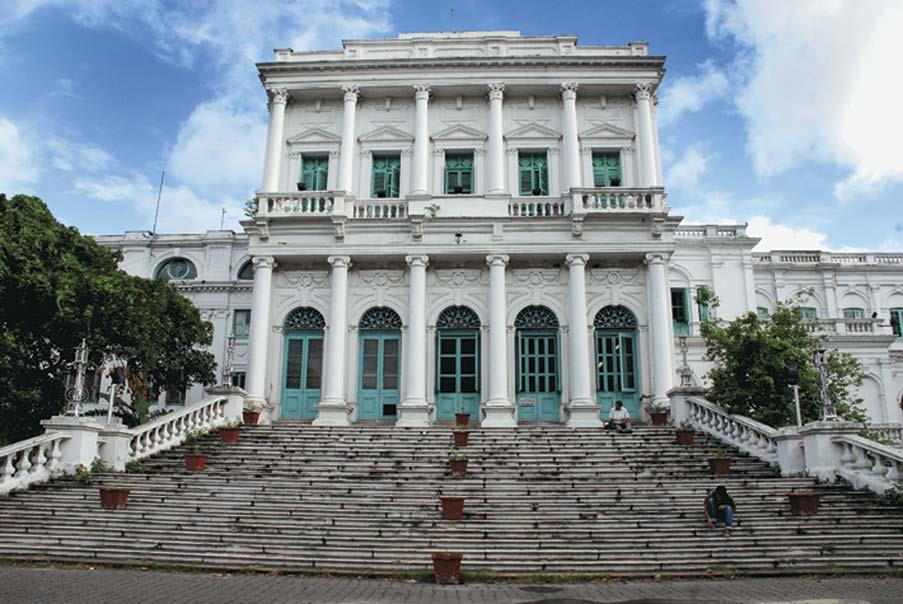There are small mercies for which we Calcuttans can be grateful, and one of them is the
Consider the bare facts: the library was started in 1836 as the Calcutta Public Library, with a stock of 4,675 volumes transferred from the library of the Fort William College. The Imperial Library was formed in 1891 by combining a number of Secretariat libraries and opened to the public in 1903 at Metcalf Hall. After independence, it was rechristened and shifted from Esplanade to its present Belvedere premises. It was a happy shift. Belvedere is a leafy arcadia in a city of vanishing green spaces, incongruously set between jail and zoo. It was on these very grounds that Warren Hastings and his council member, Philip Francis, fought an early morning duel in August 1780.
Present-day Belvedere bears no trace of that bloody memory. One walks through an imposing arch, and past pill-boxes from where the security may or may not ask you your business. A brisk walk brings you to the sprawling Belvedere House, the former palace of the Viceroy of British India. Till a few years back, this was where the stacks, reading rooms, catalogues and the library offices were situated. Now they have shifted to the spanking new Bhasha Bhaban just opposite, a functional but architecturally featureless building.
I am not one of those who deplore the shift to the new building. The new reading room is airy and spacious, and more comfortable. One remembers the hue and cry when the British Library was shifted from its British Museum premises to its present location at St Pancras. But those who have worked in both buildings will agree that the new British Library is a far more comfortable and user-friendly place than its old avatar. I am not about to make similar claims for the new Bhasha Bhaban. During the rainy season, the building still leaks and water is known to get into the stacks.
But what I really miss about the old National Library are its easy-chairs, and their sleepy occupants. On clearing the baggage counter in the portico of the old building, one walked into a hall lined with card catalogues. The end of the hall gave on to a raised area where a number of easy-chairs were arranged in facing rows. The space between them was occupied by low tables on which current periodicals were neatly arranged. At any given time, you would find these easy-chairs occupied by readers who could only be called so by a tremendous stretch of the imagination. For most of the time they slept or dozed, while an ancient fan circulated the air above them. I have often wondered about these people. Did they seek refuge from a careworn world in the cool recesses of the library? Or were they simply malingering, from work or the lack of work?
The same could not be said about the readers who occupied the reading room on the right. Formerly the palace ballroom, this room drips history from its walls and galleries. Portraits of assorted worthies regard the rows of silent readers with stern eyes. The air of fierce concentration in the room is almost palpable, occasionally broken by a stentorian cough or an apologetic sneeze. The books are delivered from the bowels of the building to the issue counter by some kind of dumbwaiter, and the slam of its door acts as a tocsin to the readers who rise from their seats and swoop in for the kill. When all the requisition slips in the world don’t yield the desired volume, the canny reader throws himself at the mercy of Ashim Chatterjee, the man who seems to know where every book is kept.
As I write this article, the local press in Calcutta is full of sound and fury about how it takes one whole hour to buy books at the National Library (they also publish). Certainly, the faults of the library are many. Getting a photocopy is a major chore, and the endless round of permissions before being allowed to take printed matter into the library makes one contemplate homicide. Nevertheless, I can forgive all the sins of the National Library for one reason: it stays open, from morning to late evening, for all the days in the year save two. Compare this to the British Library, whose reading rooms are closed for the weekend and shut at five on weekdays. The National Library is also the only library which allowed us access to its stacks, during a research project several years ago. For all this, I am unable to join the general chorus of condemnation. May it always stay that way.
National Library of Kolkata
Leave a Reply
You must be logged in to post a comment.


